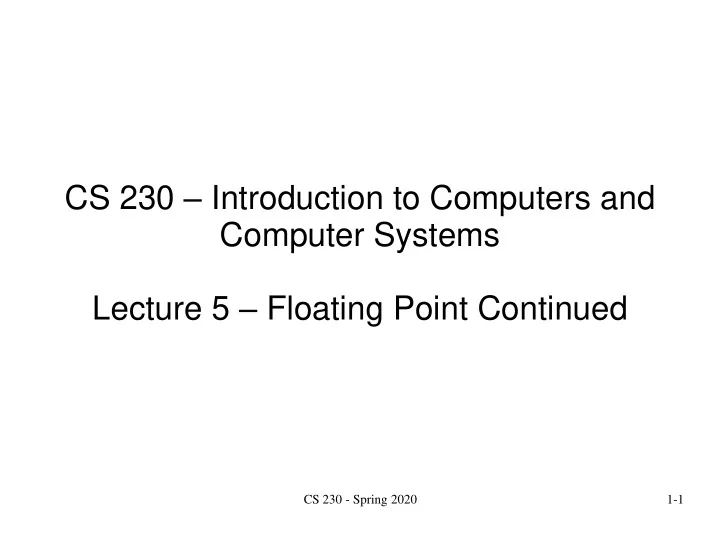

CS 230 – Introduction to Computers and Computer Systems Lecture 5 – Floating Point Continued CS 230 - Spring 2020 1-1
Normalized Representation Why do we need to move the radix point to after the first 1 bit? Why is there a 1 in the formula? (-1) S * 1 .F * 2 E-B Let’s pretend it’s a zero: consider 1.01 2 In our example format it could be (-1) 0 * 0 .1010 * 2 4-3 (-1) 0 * 0 .0101 * 2 5-3 Now we can’t compare bits for equality and we waste the potential free 1 bit CS 230 - Spring 2020 1-2
Normalized Representation Problem What is the smallest positive number we can represent in our example format? (-1) S * 1 .F * 2 E-B S=0 E=000 F=0001 (-1) 0 * 1 .0001 * 2 0-3 = 1 .0001 * 2 -3 = 0.00 1 0001 2 How do we get rid of that 1? It’s blocking all the small numbers We can’t just always use zero instead CS 230 - Spring 2020 1-3
Solution: Subnormal Only use zero when the number is too small Two forms of the floating point formula Normal: (-1) S * (1 + F) * 2 E-B Subnormal: (-1) S * (0 + F) * 2 1-B How do we know when to use which form? - When E is all zeros use subnormal Why 1-B? - We used up E=0 to mean subnormal, so now smallest exponent is E=1 and we don’t want to leave a gap CS 230 - Spring 2020 1-4
Special Cases Overflow still possible (E too large) represent as +/- infinity also for division by zero (by IEEE standard) Invalid result – Not a Number – NaN special cases, like 0/0 or ∞ *0 or sqrt(-1) can “safely” propagate during computation Both can propagate during computation no exception (like integer division by zero) CS 230 - Spring 2020 1-5
IEEE-754 Special Cases Exponent Fraction Case 000000… 000000… 0 000000… non-zero subnormal 111111… 000000… infinity (+ or -) 111111… non-zero NaN anything else anything normal CS 230 - Spring 2020 1-6
CS 230 - Spring 2020 1-7
CS 230 - Spring 2020 1-8
CS 230 - Spring 2020 1-9
CS 230 - Spring 2020 1-10
CS 230 - Spring 2020 1-11
CS 230 - Spring 2020 1-12
CS 230 - Spring 2020 1-13
CS 230 - Spring 2020 1-14
CS 230 - Spring 2020 1-15
CS 230 - Spring 2020 1-16
CS 230 - Spring 2020 1-17
CS 230 - Spring 2020 1-18
CS 230 - Spring 2020 1-19
CS 230 - Spring 2020 1-20
CS 230 - Spring 2020 1-21
CS 230 - Spring 2020 1-22
CS 230 - Spring 2020 1-23
CS 230 - Spring 2020 1-24
CS 230 - Spring 2020 1-25
CS 230 - Spring 2020 1-26
CS 230 - Spring 2020 1-27
CS 230 - Spring 2020 1-28
CS 230 - Spring 2020 1-29
CS 230 - Spring 2020 1-30
CS 230 - Spring 2020 1-31
CS 230 - Spring 2020 1-32
CS 230 - Spring 2020 1-33
CS 230 - Spring 2020 1-34
Floating Point Arithmetic Addition align radix points use normal addition Multiplication add exponents multiply significands 1.F if normal, 0.F if subnormal CS 230 - Spring 2019 1-35
CS 230 - Spring 2020 1-36
CS 230 - Spring 2020 1-37
CS 230 - Spring 2020 1-38
CS 230 - Spring 2020 1-39
CS 230 - Spring 2020 1-40
CS 230 - Spring 2020 1-41
CS 230 - Spring 2020 1-42
CS 230 - Spring 2020 1-43
CS 230 - Spring 2020 1-44
CS 230 - Spring 2020 1-45
CS 230 - Spring 2020 1-46
CS 230 - Spring 2020 1-47
CS 230 - Spring 2020 1-48
CS 230 - Spring 2020 1-49
CS 230 - Spring 2020 1-50
CS 230 - Spring 2020 1-51
CS 230 - Spring 2020 1-52
CS 230 - Spring 2020 1-53
CS 230 - Spring 2020 1-54
CS 230 - Spring 2020 1-55
CS 230 - Spring 2020 1-56
CS 230 - Spring 2020 1-57
CS 230 - Spring 2020 1-58
CS 230 - Spring 2020 1-59
CS 230 - Spring 2020 1-60
CS 230 - Spring 2020 1-61
CS 230 - Spring 2020 1-62
CS 230 - Spring 2020 1-63
CS 230 - Spring 2020 1-64
CS 230 - Spring 2020 1-65
CS 230 - Spring 2020 1-66
CS 230 - Spring 2020 1-67
Recommend
More recommend